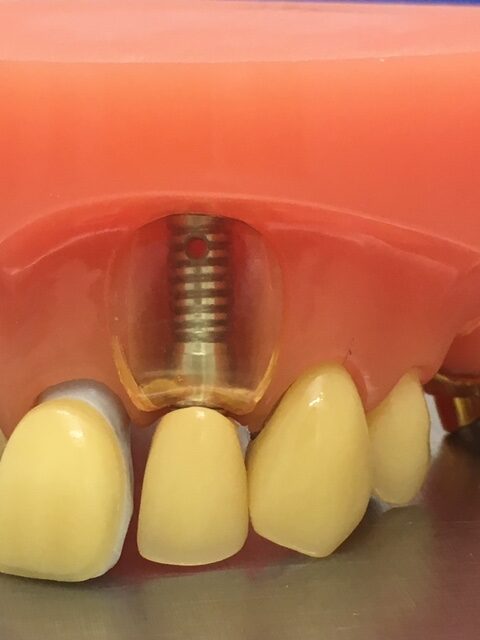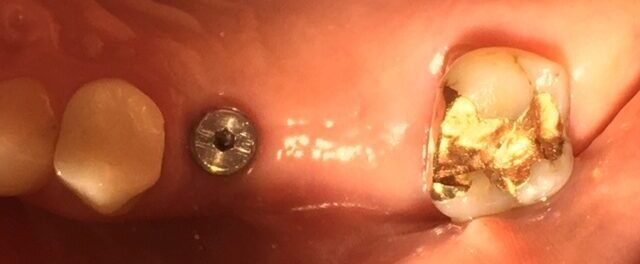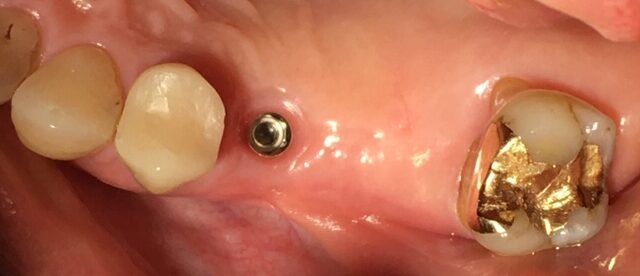A dental implant is the first step in getting a finished artificial tooth attached to the jaw. You can get an implant if you are missing one / several / all teeth. The implant screw itself forms the root, and a crown / bridge / prosthesis must subsequently be fitted, which is the part that is visible.
As a starting point, everyone can get an implant, but individual circumstances may mean that this treatment must be opted out. You must first have a thorough examination to determine if this treatment is right for you.
Implant process
An implant is a small screw that is operated into the jawbone. After a few months, it has grown along with the bone, and acts as a new tooth root. On this comes the visible part, namely the crown, and you will now have a tooth that both works and looks like a real tooth.

The screw that is operated into the jaw is 3-5 mm thick and 8-16 mm long. The special thread on the implant makes it easier for the bone to grow into it. Inside the implant there is a screw thread, in which an “abutment” (construction) is screwed and on this the crown / bridge will later be attached.
The gum around the implant’s gingiva forms / healing abutment is beautiful.
The top of the implant screw is ready to be fitted with a fixed abutment and crown.
Dental implant material and quality
Dental implants are made of titanium, a biocompatible metal that is also used in hip replacement. The jawbone grows into the screw threads around the implant, making it firm and stable.
At the clinic, we only use original, high-quality implants from reputable manufacturers. We do not want to compromise on quality or use copy products, as we want to keep the risk of subsequent complications as small as possible.
Advantages of implants over prostheses or bridges
- Aesthetic: Implants create an attractive, natural smile and look and feel like your own real teeth. They can prevent bone loss and gums from pulling. They restore lost lip support and can minimize wrinkles around the mouth.
- Tooth-saving: Implants do not usually affect the quality of your adjacent teeth. Attached bridges are quicker to make, but the adjacent teeth may need to be prepped, with the risk of future nerve and root complications. The hooks on dentures attach to the teeth and can eventually loosen them or cause cavities.
- Confidence: Dental implants are comfortable and feel like natural teeth. You have the opportunity to talk and eat without any problems. They remove pain, discomfort and limitations of maladaptive loose dentures.
- Reliable: After the healing period, the success rate for dental implants is 94% to 98%. Best if you are a non-smoker with good oral hygiene. Nothing is 100% predictable.
- Oral hygiene: Oral hygiene for dental implants is the same as for natural teeth: brushing, flossing and periodic checkups. Implant-supported dentures can be easily removed and cleaned.
What includes the first consultation
Review of your jaw, teeth, bite, mucous membranes, gum pockets, x-rays, specific treatment plan, time horizon and expected price.
Criteria for getting dental implants
Dr. Hoffmeyer, as your periodontist, will evaluate if you are a candidate.
Your are probably a good canditate if you have good general health, adequate oral hygiene, healthy gums, no periodontal disease and enough bone structure to support the implant. If not, Dr. Hoffmeyer can advise and help you, if possible, to achieve the optimal oral condition for implants.
Generally, uncontrolled diabetics and cancer patients who have recently received radiation therapy are not good candidates. Any other medical condition is usually not a contraindication for dental implant treatment.
Age restriction for implants
There is no upper age limitation. Anyone at any age can have dental implants as long as there is enough bone available in which to place the implant. Young patients under the age of 20 years old may not be candidates, due to the active growth of their jaw.
Can you go to work the next day
Usually you are ready to work again the very next day.
Factors that contribute to the long-term success of an implant
Success of a dental implant will depend on the quality of the bone, your oral hygiene, your overall health condition, smoking and your bite (clenching of teeth).
Dental Implants become fixed to the jawbone. Studies show that under the right conditions, dental implants have been in patient’s mouths for over 30 years.
Risk of being rejected
Implants are highly predictable with numerous studies reporting success rates above 90% on traditionally placed implants. Implants placed at the time of tooth extraction (“same-day-teeth”) and with immediate bite and usage may be at higher risk of failure. Dental implants are made of titanium, which is compatible with body tissues and integrates with the surrounding bone. If an implant fails, it is most likely not a rejection or infection phenomenon. It is due to the fact that the bone does not grow into the implant treads, it is therefore loose and cannot be used. The implant is then removed and replaced.
The price of implants
The price is determined by several factors (see our price list):
- The number of implants to be used.
- The amount of bone loss, need for bone building and sinus lift.
- Type of treatment: crown, bridge, prosthesis on implants.
If several implants are inserted at the same time, there is a discount on the subsequent implants. Depending on whether you want a crown, bridge or prosthesis, costs will vary. Of course, we will review these prices with you, and advise you on the best possible solution for exactly your case.
The health insurance “denmark” provides subsidies for anesthesia, X-rays, implant surgeries, implant screws, abutments / snap locks and the implant crown / bridge / prosthesis.




